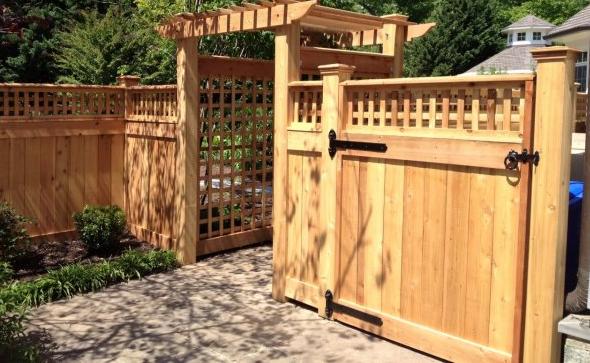All Categories
Featured
What Kinds Of Secure Fencing Materials Are Available for Residential and Commercial Projects?

When planning to set up a fence, choosing the appropriate product is essential for fulfilling the aesthetic, functional, and financial demands of your property. Whether for household or industrial usage, modern-day fence choices use a selection of selections to match specific requirements. Here's an in-depth take a look at one of the most typical fence materials available today.
- Timber Fencing. Timber is a traditional option for homeowners looking for beauty and versatility. It functions well for personal privacy fencings, ornamental designs, and boundary noting.
Trick Advantages of Wood Secure Fencing:
Visual Versatility: Can be crafted right into different designs, including picket, board-on-board, and lattice designs. Cost-Effective: Deals cost for several jobs, especially smaller residential ones. Personalized: Quickly painted or tarnished to match a home's outside. Downsides: Calls for routine maintenance, such as securing and tarnishing, to shield against weathering and bugs.
- Plastic Secure fencing. Vinyl fence has expanded in popularity as a result of its smooth look and very little upkeep needs. It's a terrific option for both household and business rooms.
Advantages:
Durable and resilient: Plastic withstands climate damage, bugs, and fading. Easy Maintenance: A fast laundry with soap and water maintains it looking pristine. Stylish Choices: Can be found in numerous colors and textures, some mimicking all-natural wood. Considerations: The first cost is greater, yet the long-lasting cost savings on maintenance can make it a sensible investment.
- Chain-Link Fencing. Chain-link fence is a sensible option for safeguarding large locations, frequently used in business, commercial, and leisure buildings.
Advantages:
Affordability: One of the most economical secure fencing choices. Longevity: Stands up to tear and put on, also in challenging settings. Presence: Supplies a clear line of sight while preserving safety. Downsides: Restricted visual appeal and privacy unless integrated with slats or foliage.
- Light weight aluminum Secure fencing. Light weight aluminum uses an advanced appearance without jeopardizing on sturdiness. It's particularly prominent for attractive or security functions.
Key Includes:
Rust-Free: Suitable for humid environments or pool enclosures. Low Upkeep: Requires marginal maintenance compared to iron or wood. Stylish Look: Commonly made use of to imitate functioned iron without the hefty cost. Factors to consider: Not as solid as steel, making it less ideal for high-security requirements.
- Wrought Iron Secure Fencing. Understood for its classic elegance and toughness, wrought iron is a favorite for upscale buildings.

Advantages:
Strength and Safety And Security: Difficult to flex or damage, making it optimal for high-security applications. Personalized Styles: Can be formed right into complex patterns for a distinct appearance. Long life: With proper upkeep, wrought iron can last for decades. Drawbacks: Calls for normal upkeep to stop rust and is among the much more pricey secure fencing choices.
- Compound Fencing. Compound fences incorporate timber fibers and plastic for a durable, eco-friendly alternative.
Benefits:
Eco-friendly: Frequently made from recycled materials. Low Upkeep: Resistant to rot, parasites, and bending. Natural Appearance: Imitates the look of timber without the maintenance. Drawbacks: Higher ahead of time price compared to standard wood secure fencing.
- Bamboo Fence. Bamboo is a lasting and fashionable selection, specifically for household buildings looking for an all-natural aesthetic.
Advantages:
Eco-Friendly: Bamboo is naturally degradable and renewable. Distinct Appearance: Adds a exotic or Zen-inspired touch. Affordable: Commonly more economical than hardwoods. Downsides: Much less resilient in extreme climates or against extended exposure to dampness.
- Steel Secure fencing. Steel fence supplies unparalleled toughness, making it a best option for industrial and business demands.
Features:
Heavy-Duty Toughness: Deals with significant influences and climate obstacles. Personalized Surfaces: Powder finishing improves its look and long life. Security: Perfect for locations needing enhanced security. Considerations: Higher cost and weight make it much less appropriate for small projects.
- Masonry or Stone Fencing. For properties seeking a long-term and extremely sturdy option, stone or masonry fence is a costs choice.
Benefits:
Ultimate Sturdiness: Withstands extreme weather condition and lasts for years. Soundproofing: Blocks sound, making it suitable for urban areas. Deluxe Aesthetic: Uses a high end look that complements high-end residential properties. Drawbacks: High setup costs and restricted adaptability in layout adjustments.
How to Pick the Right Material. When choosing a fence product, consider the list below factors:
Purpose: Do you need safety, privacy, or decorative charm? Budget: Some products, like wood and chain-link, are cost-efficient, while wrought iron and rock come at a premium. Upkeep: Products like plastic and aluminum are less complicated to keep, while wood and wrought iron requirement routine treatment. Climate: Some products, such as bamboo or untreated wood, are less ideal for rough weather. Conclusion. Fencing products today offer a broad variety of alternatives to fit different budget plans, features, and designs. Whether you focus on durability, appearances, or eco-friendliness, there's a product that will certainly fit your needs. By functioning with a specialist secure fencing specialist, you can explore these choices extensive and guarantee a remarkable installation for your business or property job.
Latest Posts
The Benefits of Routine Vehicle Maintenance at Montclare Auto Repair Saves You Money
Published May 26, 25
1 min read
Choosing the Right Roofing Color: Influence On Power Effectiveness
Published May 24, 25
1 min read
Boost Your Home's Outside with Weathercraft's House siding Solutions
Published May 24, 25
1 min read
More
Latest Posts
The Benefits of Routine Vehicle Maintenance at Montclare Auto Repair Saves You Money
Published May 26, 25
1 min read
Choosing the Right Roofing Color: Influence On Power Effectiveness
Published May 24, 25
1 min read
Boost Your Home's Outside with Weathercraft's House siding Solutions
Published May 24, 25
1 min read